05.01.2021 - 7 min read
Social Project
I had always been really interested in NGOs, refugee studies and humanitarian worked. I decided to apply for volunteering roles with humanitarian organisations to gain experience and travel a bit on the side, and through a friend's connection had organised to teach English at a school in Zaatari Refugee Camp, Jordan with the charity Acting for Change International. After going back and forth with the NGO and arranging my volunteering for Summer 2018, the Director of Operations had said they were looking for ideas to turn their school into more of a community centre which could provide educational programmes for their children and young adults during the Summer break. At the time I was pretty into DJing and had a radio show in London and had come across refugee radio stations in Camps in Uganda during my university studies that really fascinated me. After suggesting this idea to the charity, they offered me the opportunity to take this project on, and Zaatari Radio was born.
By January 2018 I had about 5 months to make this idea a reality, and began planning how to organise, fund and implement a radio station from the school. I was selfishly adamant I could do this on my own, however two close friends wanted to get involved and from that point Zaatari Radio went form an idea into its own NGO. Liam Evans is a musician, sound engineer and sharp-minded technical wizard who had the knowhow to build the radio and also transform the idea into a functioning FM radio station. Clare Thompson is an artist and designer who was able to transform any idea into a visually representative work of art that caught people's imagination and made an abstract idea of a refugee run radio into something visually tangible that could gain the necessary support to run the project. Without Liam and Clare, Zaatari Radio would never have happened.
By Summer 2018 we successfully fundraised for the radio, organized all the necessary equipment and collectively designed a project in which the radio could offer workshops for children based on challenges living in Zaatari as a refugee.
Yes particular attention here to the role of Dana Al Natsheh, a Palestinian-Jordanian who has been our translator since 2018. Beyond translation, she single handedly takes on workshops and creates a priceless bridge between our work and the children which makes the whole radio possible. Incredible human being and awesome taste in death metal music!
The first time we went to Jordan, we spent two months there, working three days a week from Zaatari setting up the radio and working on radio-based workshops that were designed to teach the kids how to use the equipment and address challenges refugee faced in the camp such as health, lack of information on services and mediums for creative outlet. Despite our best plans to rigidly design a curriculum that could service the needs for the children as outlined within Needs Assessment Reports published by organizations such as the UN, no one knew what the children needed more than themselves. As an outsider you can come into a place like Zaatari with as much prior knowledge as you think you have, but in reality you will always be an outsider with preconceptions that fail to address the true experiences of those who live their daily life there.
We continued with the curriculum but the radio became more of a blank canvas for anyone to use the equipment in whatever way they wanted: radio shows about football, news, love songs, or just conversations between two friends. The radio itself does not change the situation in Zaatari but the children who create their own solutions themselves do. The radio is just one small piece of a complicated puzzle which at times may be useful to share important information for people living in Zaatari, or may equally be just as important to the two friends who want to have a conversation with each other live on air.
After two months in Zaatari we left leaving the radio equipment and a 'How-to-use Guide' so Acting For Change can continue letting people use the radio. We returned in 2019 with workshops again with the idea to use the radio as a blank canvas for the kids to explore what interested them about living in Zaatari. Across these two years Zaatari Radio has hosted photograph exhibitions, commentated on World Cup soccer games and live broadcasted music composed with recycled materials from the camp during these workshops.
NGO goals: news broadcasting, health messages and artistic output. We created news broadcasts that focused on relevant global news stories as well as localised news of what is happening in Zaatari. This was then appropriated locally when the children wanted to share information of what their life was like in Syria and what was going on there at the moment. Health messages focused on prevalent communicable diseases in Zaatari, specifically respiratory tract infections. We make creative shows such as short radio shows that share important information about reducing infection rates (similar to COVID now e.g. wash hands, social distance if ill etc. etc.)
Creative output: children took disposable cameras and documented their weekly life in Zaatari and made stories out of the photos on the radio. We then created a photo exhibition and used the radio to advertise the show as well as when people came to see the photos, retelling the stories through a radio which was in the exhibition.
Lots of local appropriation with the new stories, health messages and creative output of the radio. For example, we worked to clear up the local area by picking up trash that we upcycled into musical instruments and created a percussive piece to be broadcast on the radio. Liam Evans is a musical wizard and took on the task of creating music with the children which was based on our Western idea of 4x4 music patterns. However, the children took this and created something infinitely better within their more natural Curcana 10/8 drum pattern. It is a good story to show that as an outsider you can come in but your idea of helping is always shaped within the society you are brought up in, and the local population nearly always will be able to appropriate this to be contextually better.
They are developing an arts programme in 2021 based at 7Hills and we are talking together about hosting similar radio workshops onsite, however redesigned to answer the different challenges urban refugees face in Amman. For now this is just a possibility but we are still super excited for this prospect because we love 7Hills! ...and Amman as a more cosmopolitan urban environment presents an opportunity to create workshops focusing on young adults and more artistic endeavours which would be very fun!
2020 was going to be a big year for us to develop the radio, we had the amazing radio play ready to be implemented with the help from people from the Freedom Theatre in Palestine and a youth leader programme to help the sustainability of broadcasting but covid and lockdowns halted our operations. Jordan was nearly impossible to enter for much of the year and then Zaatari itself was in complete lockdown from outside NGO work. It really showed how tentative NGO work can be and ill prepared it was for something like Covid.
We are looking to implement what we had planned in 2020 in 2021 with the added 7Hills Arts Programme Work. It’s a lot of work but 2020 was such a bummer that we are ready for it!
I think that feeding into a narrative that refugees have no chance to get their voices heard and it is our role as outsiders to elevate their voice is potentially problematic, but for sure parallels between the two uses of radio can be made. In fact, it was the basis for a lot of the support we get as an organisation from the start: underground online radios particularly in London have helped us a great deal in getting where we are today because they recognise a transformative role radio can play in peoples lives.
As for providing a voice for people... for sure refugees are cast out of the system and always told they are a problem, however everyone has a voice but maybe lack a platform to shout about stuff. I wouldn't say we are much use for people to discover new talent, but a medium for people to feel valued and that outsiders are listening and caring about their own problems. I remember a really touching sentiment one of our workshop attendees said about how speaking on the radio made her voice reach beyond the refugee camp and that people were listening to her (even though she knew that not many people would be tuned in!) For me, this was an incredibly powerful thing to hear. So we can help people feel valued from the radio equipment in Zaatari and as an overall organization we can do our best to communicate what life is like in Zaatari and the challenges people face to the people who support our work from the West.
For Sure! This goes back to what I said about "giving a voice". Imagine having some random people turn up at your school one day who are from a complete different world and are like "hey there, i am giving you a voice"... you'd say "Here's my voice I already had telling you to do one!". For sure the media really push a passive narrative of refugees: they are helpless, obsolete, desperate and in need of our support, and somewhere down the line this feeds into ideas of othering people and separating yourself from their experiences. Similarly, saying we are giving a voice to people does the same. But giving a platform for people to represent themselves however way they want? Even if they say "hey radio is actually super lame?" That sits way more comfortably with me!
Children are completely under looked within development studies and humanitarian work. Because they are considered young and inexperienced, they are treated like passive actors who are disempowered needing organisations to work on their behalf. In truth, children see the world and imagine solutions to problems that adults can never do. They are imaginative, pragmatic and not scared of falling down. This is something that Clare Thompson has installed within the mentality of our work now, she has the mind of a child in the greatest way possible. She connects with the children we work with on such a personal way that makes the work we do infinitely better and well suited for the kids.
I guess the original idea of the three main workshop objectives were this, we had our ideas and preconceptions and needs that we thought the children had, and although these were based on data/needs assessment reports, these papers are only one way of conceptualising problems, needs and challenges. In the end the radio isn’t a medium to address these challenges, but an open platform for us to discuss, interrogate and reimagine these challenges with the children who are able to bring their own unique experiences into doing this.
-> Radio Zaatari Website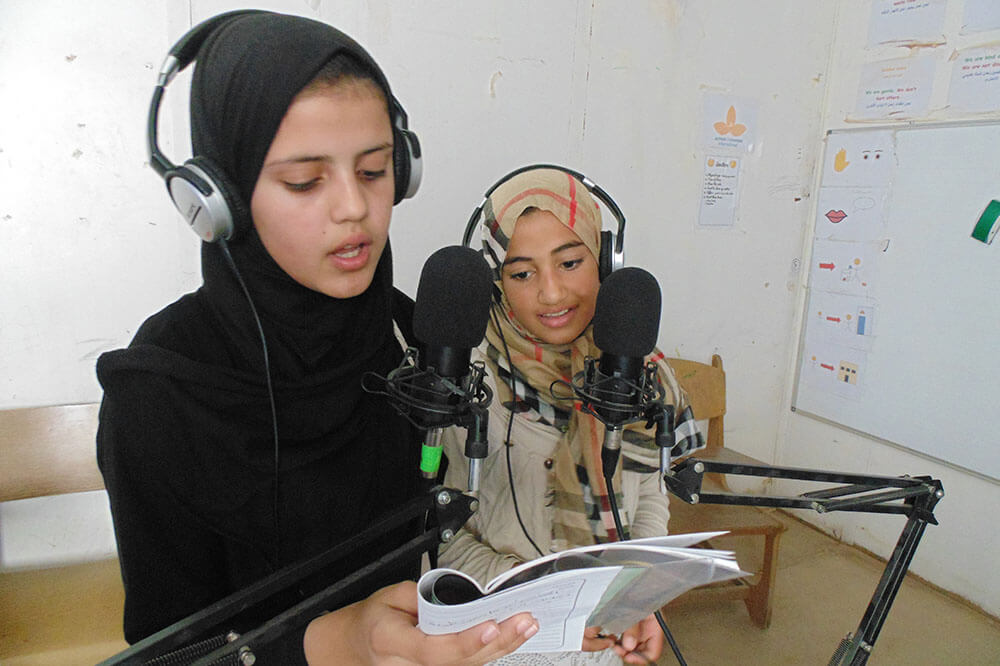
Picture by Radio Zaatari
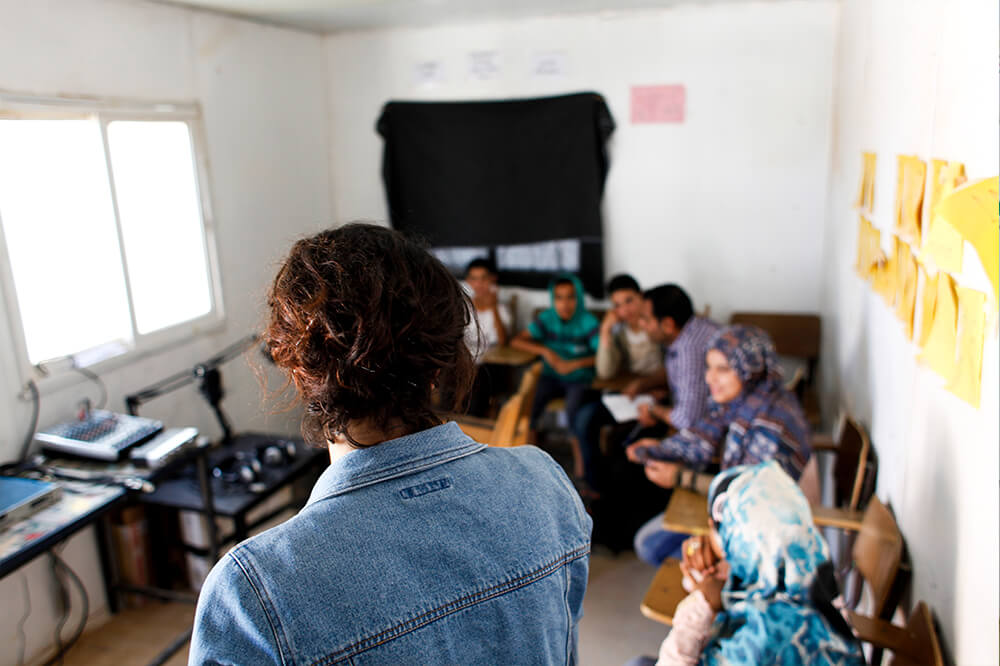
Picture by Radio Zaatari
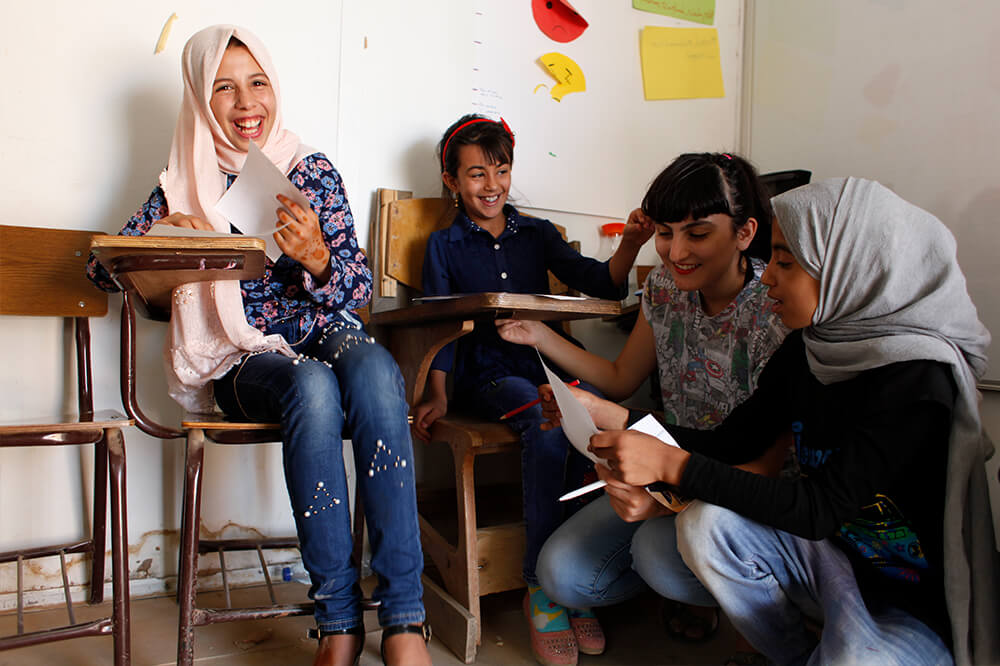
Picture by Radio Zaatari
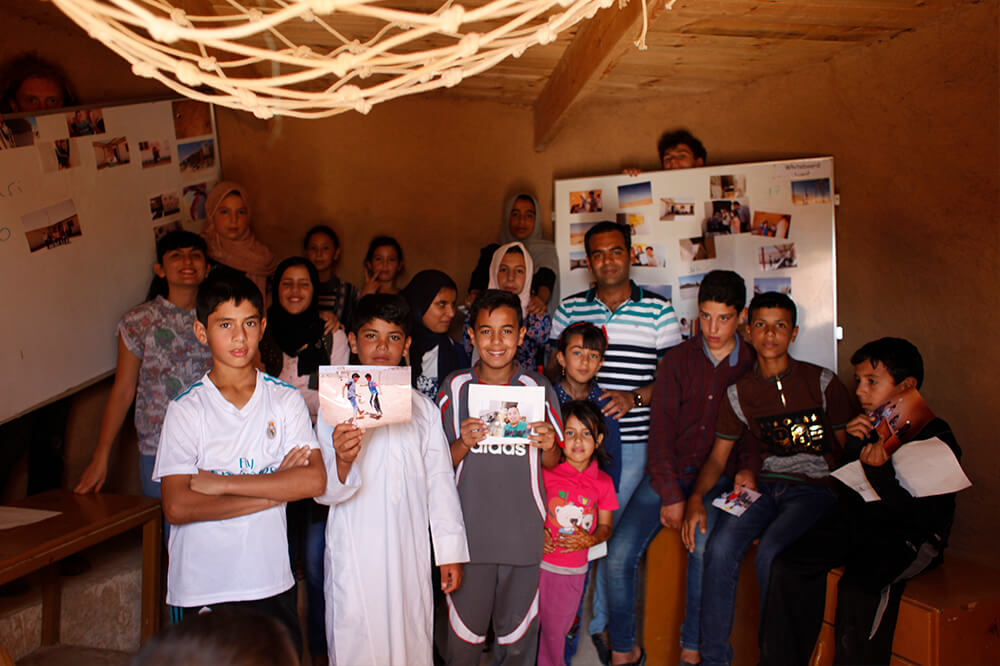
Picture by Radio Zaatari
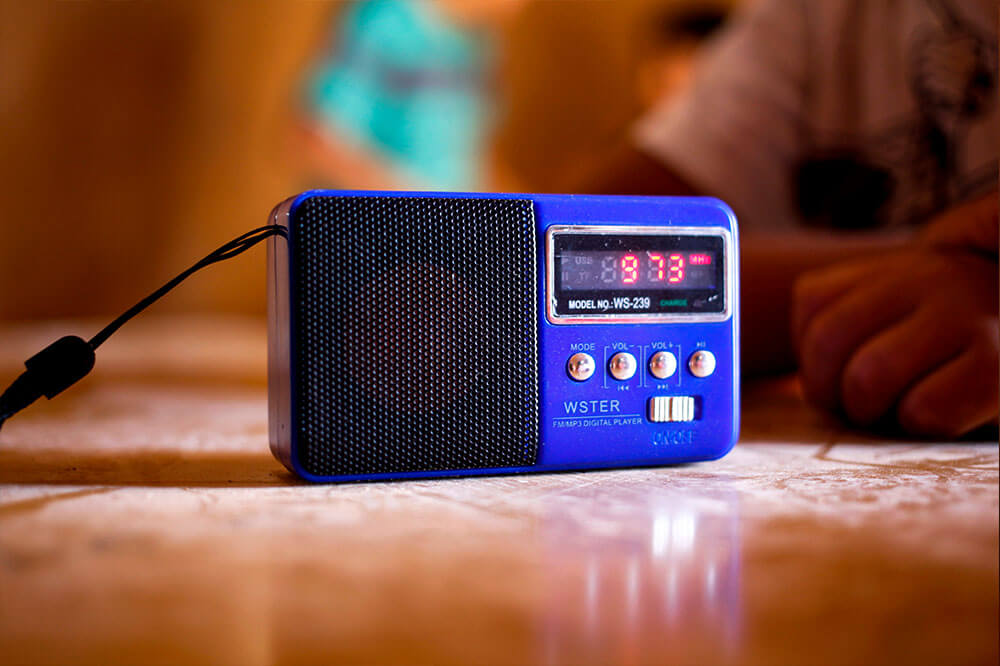
Picture by Radio Zaatari
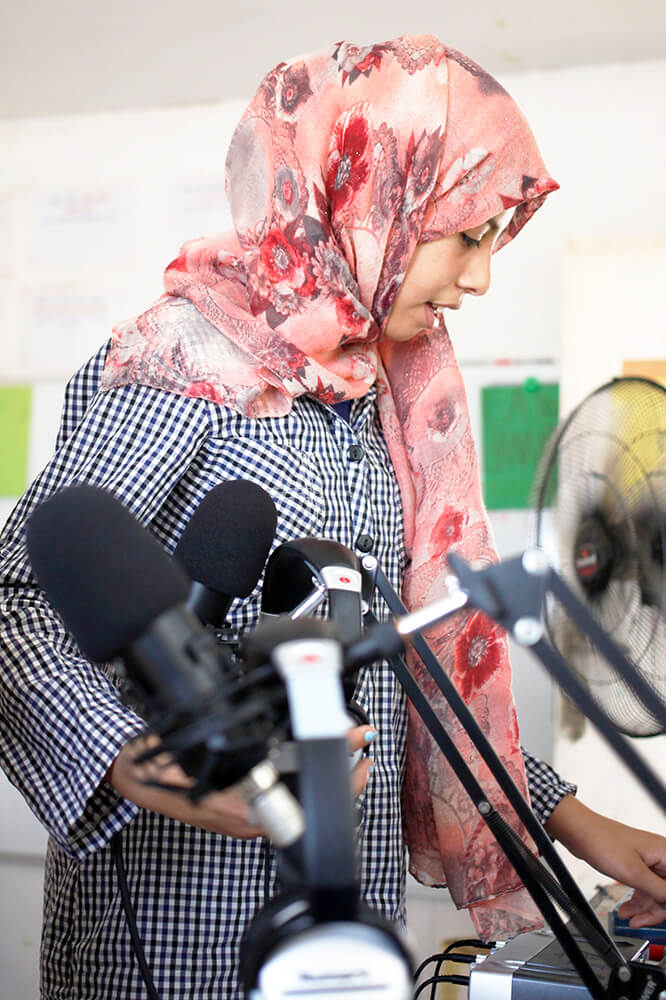
Picture by Radio Zaatari
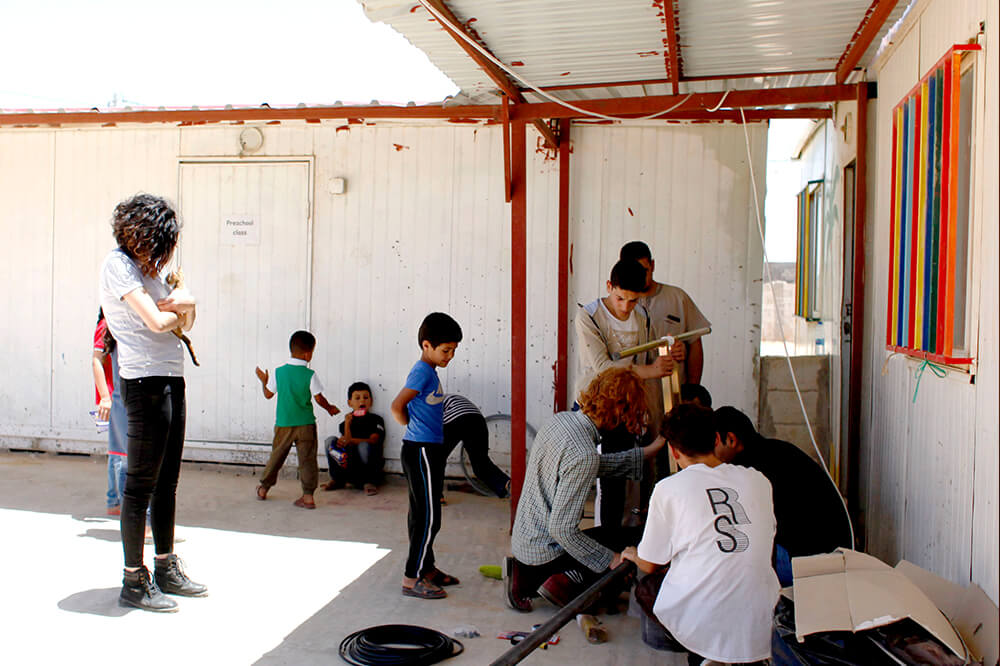
Picture by Radio Zaatari
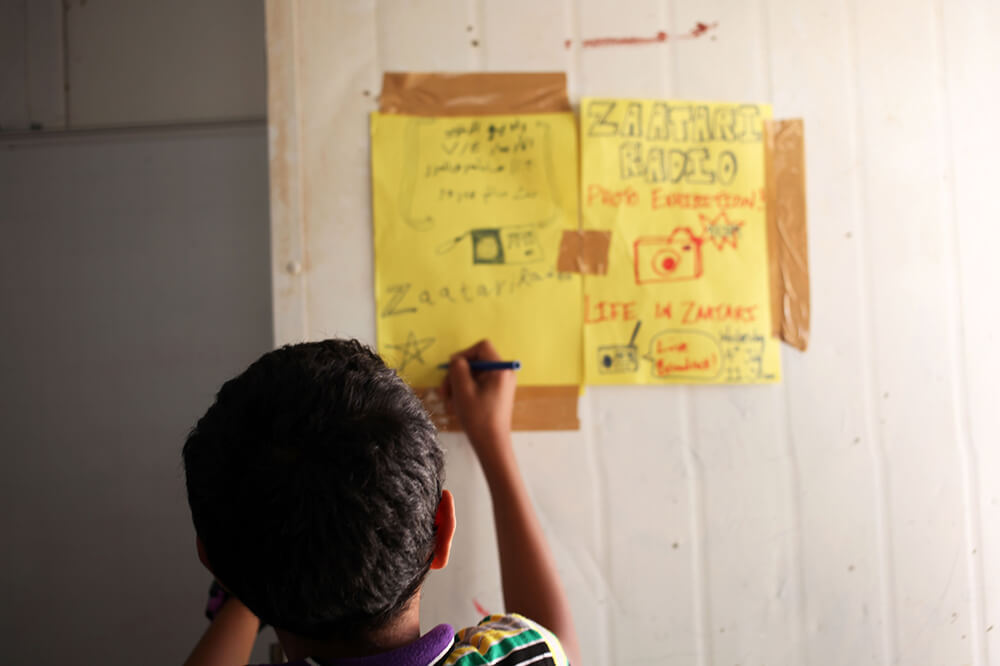
Picture by Radio Zaatari